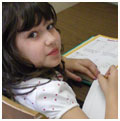 |
|
 |

Talking About Homework Research reveals that when afterschool staff, day-school teachers, students, and parents communicate openly and regularly, students are more engaged and focused on their homework. As a result, teachers report an increase in homework completion.(1) Day-school teachers can provide helpful insights about student work and homework assignments. Let teachers know homework help is available, and ask teachers about what types of materials and resources are typically needed. Invite day-school teachers to participate in afterschool homework time periodically to help establish priorities and procedures, and to provide direct support to students who may need additional help completing complex assignments. Communicating with day-school teachers and families can be a simple process. The homework section of the online Afterschool Training Toolkit offers tools such as a homework log and a template for memos to day-school staff. The homework log is useful for recording assignments and tracking progress. It can also be used to help students manage their time, prioritize the things they need to do, and assess their own progress. The memo template gives an example of how you can provide ongoing communication with day-school staff. To involve families in student homework, invite them to visit and participate in the afterschool program during homework time. A visit provides examples of positive homework environments and an opportunity to discuss strategies parents can use at home. It helps parents see how checking in with their children, using homework logs, and asking them to keep track of questions they have will provide structure and accountability for students. Discussing the structure and expectations of homework time can help students set and meet homework goals and is another way to keep parents and day-school teachers informed. Consider using a written agreement, signed by students, parents, teachers, and afterschool staff, that details each person’s commitment to homework completion. This written agreement should clearly describe each person’s role in homework and what is expected during homework time. 1 Seppanen, P., Love, J., deVries, D., Berstein, L., Seligson, M., Marx, F., & Kisker, E. (1993). National study of before- and after-school programs. [Final report.] Washington, DC: U.S. Department of Education, Office of Policy and Planning. |
|
 |

Afterschool Curriculum Choice:
Literacy Resources
This free online resource helps practitioners locate |

|
Bedford County 21st Century Community Learning Center Consortium
|
 |
 |
 |
||||||
|
|
Let Students Take the Lead |
|
||||||
|
This email was sent by: Editor: Laura Shankland This newsletter was produced
in whole or in part with funds from the U.S. Department of Education
under contract number You are welcome to reproduce issues of AfterWords and distribute copies at no cost to recipients. Please credit SEDL as publisher. Link to PDF versions of AfterWords is available here. For additional uses, please fill out and submit a copyright request form. Copyright © 2008 by SEDL. |



